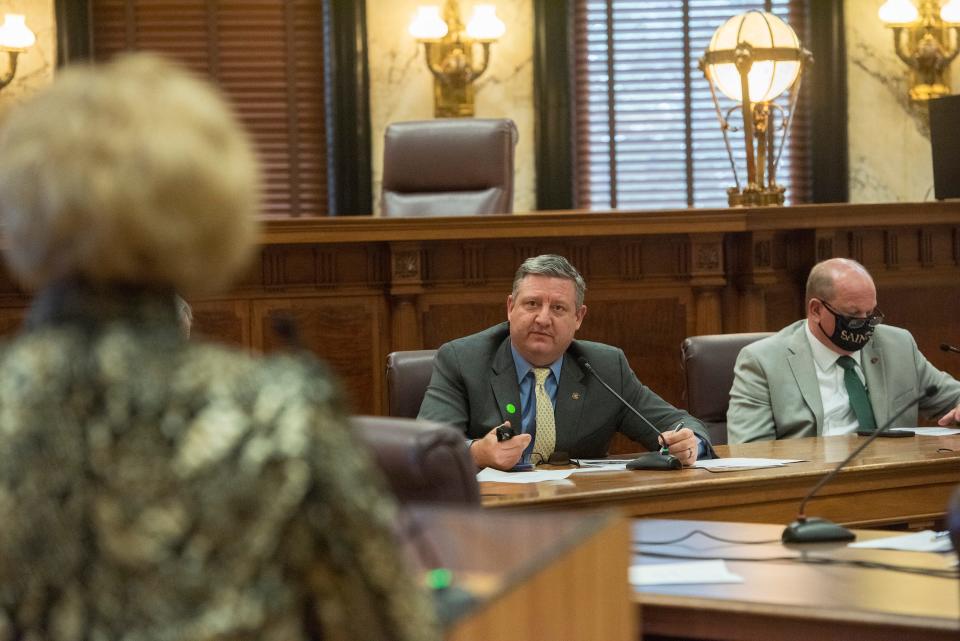Mississippi Senate blocks House K-12 education funding bill
It took all of 10 minutes Tuesday for the Mississippi Senate to kill the only vehicle left for legislators to make revisions to K-12 education funding, and House lawmakers are now willing to hold school funding off until the Senate agrees to negotiate.
Senate Education Chairman Dennis DeBar, R-Leakesville, asked Senate lawmakers not to concur with Senate Bill 2332, which had been changed from an increase in Mississippi Adequate Education Program funding totaling more than $2.9 billion, to the INSPIRE Act, the House's new $3.01 billion method to fund public schools.
"Because of the numbers, because we have four or five different iterations (of funding), I did not feel confident in bringing this (bill to the Senate)," DeBar said.
Voting not to concur on a bill means the chamber that originally passed the legislation is now killing it. However, DeBar does have 24 hours to reconsider, but he said that isn't going to happen.
DeBar said he decided not to move the bill forward into a conference committee because he thought there were too many philosophical differences between the House and the Senate's approach to funding schools. He also said he wants to take more time to make sure school districts that need more funding than others obtain it.
DeBar later told the Clarion Ledger he hopes to work out a new method to fund education with House members either in the summer or next session, which begins in January 2025.

"It was imperative we just not take it up this session," DeBar said. "I've met with House Education Chairman Rob Roberson, given my promise to work with him over the summer throughout the offseason, to devise a new plan and revise it."
After the meeting, the Senate Appropriations Committee moved forward a bill to include MAEP funding of about $2.97 billion. Lt. Gov. Delbert Hosemann said in a written statement later Tuesday that the bill would also designate the Mississippi Department of Education to study the House and Senate plan to reform education funding, and it would report its findings back to the Legislature in October.
“We are not married to the current formula," Hosemann said. "We do, however, believe any appropriation as significant as that which funds our school systems should be vetted and discussed with stakeholders including parents, educators, and the public at-large. Studying the issue together, in connection with the Department of Education and our new superintendent, will hopefully result in a new, long-term sustainable formula both chambers can agree on which is good for students and schools.”
However, several House members, including Education Chairman Rob Roberson, R-Starkville, and Rep. Jansen Owen, R-Poplarville, both said the House is highly unlikely to accept any education funding that doesn't come from INSPIRE's allocation model.
"It is the House's No. 1 priority to see this passed," Owen said. " This is the largest single investment in public education ever. This is our priority. We are committed to passing this bill this year."
The House originally passed INSPIRE's original form, House Bill 1453, in February, and amended all of 2332 and replaced its language with the INSPIRE Act.
DeBar let HB 1453 die by a March deadline to move bills out of committee, and before Tuesday, had not publicly spoken about his views on moving forward the INSPIRE Act.
Roberson told the Clarion Ledger he was shocked by the news and disappointed with DeBar's decision, having been given an impression that the bill would move to a conference committee from conversations they had before the Senate met Tuesday.
"I don't know what to say. I'm disappointed," Roberson said.
With both education funding models dead, the only bills left to fund public education is the Senate appropriations bill that moved forward Tuesday after the Senate recessed, and a House bill to fund the INSPIRE Act. Technically, lawmakers still have a way to allocate funds to public education, but Roberson and Jansen both are determined not to play ball unless the Senate negotiates for Roberson's bill.
House Speaker Jason White, R-West, said in a press release Tuesday afternoon that he was greatly disappointed in the Senate's decision, and that he remains committed to the INSPIRE Act.
"As Speaker of the House, I have clearly communicated with Senate leadership the House position that we have funded MAEP for the last time," White said. "As we near the end of the legislative session, the House will continue to look for ways to fund education with a student-centered formula.”
What will happen if the Legislature doesn't approve an education budget?
Roberson said the current year's education funding will run it's course by the end of the fiscal year, meaning that if lawmakers do not approve an education budget or model by July, schools could go without state funding.
To stave off that circumstance, Roberson said Republican Gov. Tate Reeves may need to call a special session to address shortfalls in funding and avoid some schools closing due to a lack of funding.
'We can come up with a change to the budget itself to do the MAEP type formula, but I don't think there is interest in that on the House side," Roberson said. "I just don't see that being something that my members are going to want to do. I am completely OK with us coming back (in a special session) and dealing with it, but I don't want to wait too long, because this puts the school district in a bad position."
Grant McLaughlin covers state government for the Clarion Ledger. He can be reached at gmclaughlin@gannett.com or 972-571-2335.
This article originally appeared on Mississippi Clarion Ledger: MS Senate blocks bill to fund $3 billion toward K-12 education

